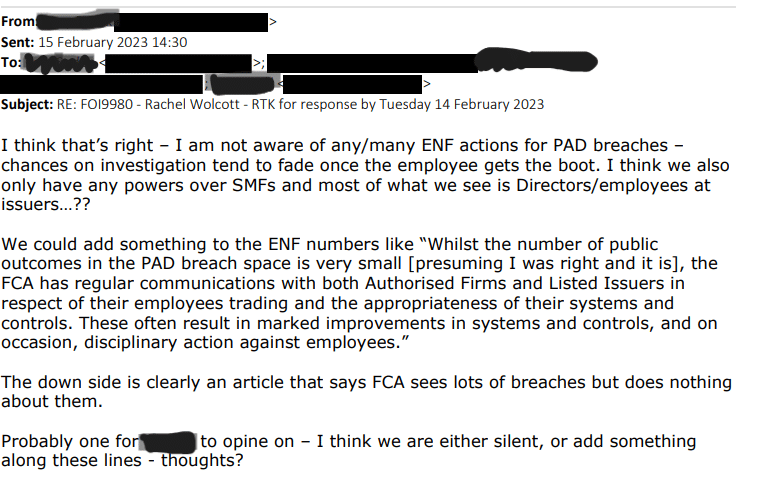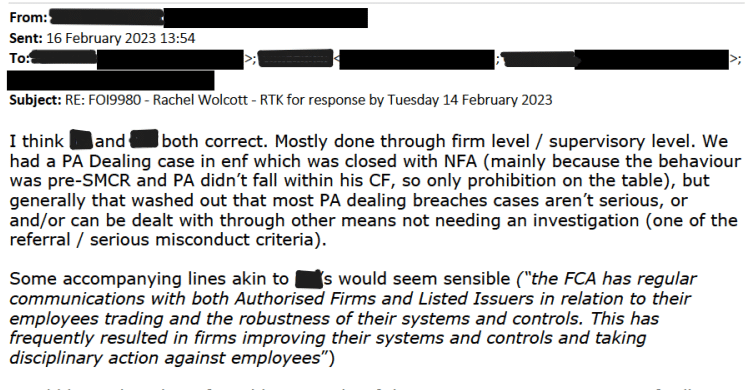Market Abuse
Personal account dealing breaches ‘aren’t serious’, not an enforcement priority: FCA emails
• 0 minute read
December 11, 2024

Most personal account dealing (PAD) policy breaches “aren’t serious”, say internal UK Financial Conduct Authority (FCA) emails disclosed as part of a Freedom of Information Act request. In their email discussions, FCA managers referred to PAD breaches as a disciplinary issue for firms, rather than one of enforcement by the regulator.
This characterisation of PAD breaches is at odds with the FCA’s 2019 warning about serious breaches observed at firms, while the recent Mohammed Zina insider dealing case also centred on PAD activity the FCA classifies as breaking its rules.
“Controls against personal account dealing are a critical part of preventing market abuse. Our expectations, as outlined in Market Watch, remain clear: firms are the first line of defence and must act when employees breach the rules. The email commentary outlined in the FOI does not contradict that,” said an FCA spokesperson.
PAD warning issued
The FCA warned firms about PAD both before and during the Covid-19 pandemic. Market Watch 62, published in October 2019, addressed concerns about “how often [the FCA] was seeing apparent breaches of PAD policies”.
Its findings included: front-office employees “not appearing to understand their firm’s PAD policy despite having signed attestations that they have read, understand and will comply with those policies”; the belief that “ignorance of PAD policies provides reasonable mitigation for PAD in breach of that policy”; and “employees — including front office, compliance and surveillance — deliberately not declaring external accounts to their employer and/or circumventing requirements”.
The FCA also found employees trading in breach of PAD policies, including dealing in conflict with their “professional decisions/recommendations”. Instances involved analysts and fund managers telling clients or their funds to sell a security that those bank employees were then buying, and employees copying client orders.
No action taken
The regulator did not open any PAD enforcement investigations between February 2020 and February 2023, however, according to a Freedom of Information Act response (FOI9980). Many market participants worked and traded from home during this period of intermittent Covid-19 lockdowns.
However, redacted emails — supplied as part of a new information request seeking more information about FOI9980 — show FCA managers discussed how to explain the lack of enforcement action to a journalist. They expressed the view that financial services employees who breach PAD rules are generally dismissed or disciplined internally.
“Chances on investigation tend to fade once the employee gets the boot. I think we also only have any powers over [senior management function holders] and most of what we see is directors/employees at issuers….?” said a manager in the FCA’s secondary market oversight team.
The FCA spokesperson said the regulator has a range of tools at its disposal for dealing with breaches.
“Where there is evidence failures in firms’ controls or serious misconduct or harm, we will intervene. We will consider a firm’s response against individuals when considering what actions are appropriate. Employees dismissed for regulatory breaches face significant challenges re-entering the industry. We weigh this when considering what further action, we wish to take,” the spokesperson said.

Another FCA manager in the markets reporting team wondered whether a journalist would accept the explanation that zero enforcement meant there were no breaches. It appears to be a response to the secondary market oversight manager’s concern that the “downside” of including a caveat with the FOIA response about engagement with firms would be an article saying “that the FCA sees lots of breaches but does nothing about them”.

“Most PAD cases aren’t serious and/or can be dealt with through other means not needing an investigation (one of the referral/serious misconduct criteria),” said a third manager, who was also in the secondary market oversight team.
This view contrasts with Market Watch 63 in May 2020, which expressed the concern that firms did not submit suspicious transaction order reports (STORs) about their own employees’ PAD, while the FCA said in Market Watch 62: “In these cases, it is not evident that all firms take appropriate actions after identifying this behaviour, such as investigating, considering how to mitigate the risks arising from those employees, or taking disciplinary action against employees in breach of their firm’s PAD policy.”

The entirety of this email exchange can be found here.
Zina case
On February 14, 2024, Mohammed Zina was found guilty of six offences of insider dealing. Zina, who worked at Goldman Sachs International in London used three different accounts to trade shares, according to judge Tony Baumgartner’s sentencing remarks.
He used a Halifax Share Dealing account in his brother’s name, as well as Hargreaves Lansdown and IG accounts in his sister’s name, to trade shares associated with his conviction.
“You knew that you should tell Goldman Sachs of any shares which you bought or sold, and you used these accounts to conceal the fact that it was you who carried out the trading through them,” said the judge.
In 2019’s Market Watch 62, the FCA expressed concern with “how often we are seeing apparent breaches of PAD policies” including “operating undeclared accounts in the names of relatives where trades are executed without any input from the named account holders”.
Market cleanliness statistics
Separately, the regulator revealed on Monday that its market cleanliness statistics (MCS) had not captured potential insider trading activity prior to takeover announcements, and periods of high market volatility such as the pandemic. It has changed its methodology to include intraday trading activity that performs in periods of heightened market volatility.
Brokers, particularly in the retail sector, note that trading activity ahead of takeover announcements can be driven by social media posts — some real, some fake and designed to move markets — as being a particular challenge for their trade surveillance systems. Compliance Corylated reported on this issue here.
Visit the video page for the FCA email short.